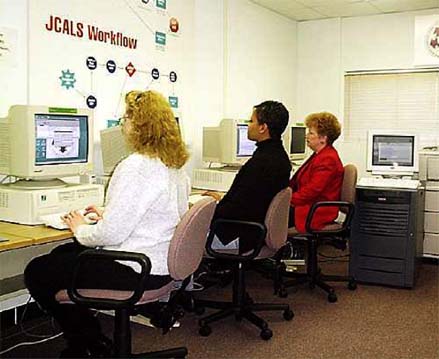JOINT COMPUTER-AIDED ACQUISITION AND LOGISTICS SUPPORT
(JCALS) SYSTEM

|
The Joint Computer-aided Acquisition and Logistics Support (JCALS) system is a multi-Service, geographically distributed client-server system designed to process all data and information required to manage, control, and produce each Service's technical manuals at designated technical manual processing sites. The program is developing an infrastructure to logistically support weapons systems throughout their life cycles. At its heart is the Global Data Management System (GDMS), the middleware connecting JCALS users with legacy data repositories. The GDMS provides transparent access to data anywhere in the system regardless of where it is stored, how it is formatted, or how it is accessed. A System Operational Support Center (SOSC) provides overall system management and administration, and assists the system's several hundred functional users.
BACKGROUND INFORMATION
JCALS is being developed in increments called Software Packages (SWPs). The first increment, SWP 1/2, has been fielded. The second increment, SWP 3.1, is completing DT&E. A third increment, SWP 3.3, is still in development. These SWPs contain the following general capabilities:
- SWP 1/2. A basic automated capability for accessing and exchanging technical information on weapons systems among the Services and DoD agencies. Air Force sites were provided with a modification that introduced a basic Joint Technical Manual (JTM) capability.
- SWP 3.1. Replaces Army and Navy technical manual legacy systems with enhanced JTM functionality, adds a publishing capability for the Marine Corps, affords wider connectivity (more interfaces), and provides a web-based capability.
- SWP 3.3. Provides the core functionality necessary for all the Services to routinely perform their JTM business practices without workarounds.
In 1998, ATEC, the independent OTA, conducted an IOT&E of JCALS hardware and SWP 1/2, in compliance with the TEMP approved by DOT&E in May 1997. The focus of the test was to examine technical manual activities and SOSC capabilities. DOT&E's evaluation revealed a variety of problems, and the PMO began to take corrective actions. Based on the follow-on assessments by ATEC, DOT&E concluded that JCALS was operationally effective and suitable for the Army, Navy, and Marine Corps, and it was deployed to those Services. The PMO then developed a "modified SWP 1/2" for the Air Force that underwent rigorous regression testing in the laboratory and follow-on evaluation in the operational environments through 1999. DOT&E subsequently found the "modified SWP 1/2" operationally effective and suitable for the Air Force and it was deployed to Air Force sites.
TEST & EVALUATION ACTIVITY
The TEMP was updated in April 2001. Overall requirements are based on a user-approved Joint Minimum Essential Requirements List, rather than an Operational Requirements Document. As T&E has progressed, the JCALS PM has continued to refine the JCALS acquisition strategy and the definitions of the SWPs. DT&E of SWP 3.1 was completed in late December 2001. In the final phase of software qualification testing, the software was installed and tested with operational users at 13 beta sites in CONUS that encompass all of the Services. OT&E at these sites was scheduled to begin in January 2002. OT&E for SWP 3.3 is currently planned for 4QFY02.
TEST & EVALUATION ASSESSMENT
JCALS has provided better technical manual utility as the Service end users and system administrators gained experience with it. The Joint Technical Manual application is said to have done particularly well at Warner-Robins AFB, GA, where a strong effort was made to adapt business practices to the new system. However, software development complexity, integration issues, aggressive timelines, and issues identified during DT&E have continued to impact the acquisition. The 2QFY02 OT&E results and subsequent DOT&E assessment should indicate whether an enhanced JCALS has successfully overcome enough of these problems to warrant further fielding at this time.
|
NEWSLETTER
|
| Join the GlobalSecurity.org mailing list |
|
|
|

